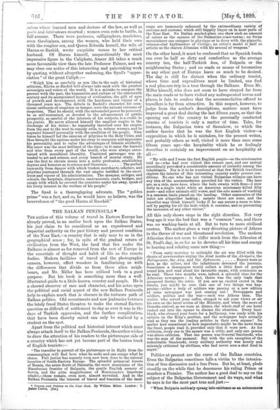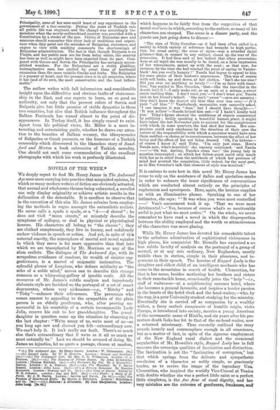THE BALKAN PENINSULA Tin author of this volume of travel
in Eastern Europe has already proved, in an earlier book upon the Balkan States, his just claim to be considered as an experienced and impartial authority on the past history and present condition of the Near East,—a country that is only near to us in the geographical sense ; for, in spite of the gradual return of civilisation from the West, the land that lies under the Balkans is almost as far removed from the rest of Europe in the essentials of thought and habit of life as the remote Indies. Modern facilities of travel and the photographic camera, however, effect wonders in familiarising us with the differences that divide us from these alien neigh- bours, and Mr. Miller has here utilised both to a good purpose. But his book is something more than a well- illustrated guide to a little-known country and people. He is a shrewd observer of race and character, and his notes upon the political and social aspect of the new Balkan Peninsula help to explain much that is obscure in the tortuous path of Balkan politics. Old resentments and new jealousies between the lately freed States threaten to make the eternal Eastern question as difficult of settlement to-day as ever it was in the days of Turkish oppression, and the further complications that have been thereby raised can only be realised by a student on the spot.
Apart from the political and historical interest which must always attach itself to the Balkan Peninsula, the author wishes to draw the attention of his readers to the picturesque side of a country which has not yet become part of the beaten track of English tourists :— " The traveller in pursuit of the picturesque or in flight from the commonplace will find here what he seeks and can escape what he shuns. Full justice has scarcely even now been done to the natural beauties of South-Eastern Europe. The splendid primeval forests of Bosnia, the azure fiords of Dalmatia, the snow mountains of the Macedonian frontier of Bulgaria, the gentle English scenery of Servia, and the grim magnificence of Montenegro's limestone citadel,—these remain, even now, almost unvisited. And in the Balkan Peninsula the interest of travel and beauties of the land- • Travels and Polities in the Near East. By William Miller. London : T. YAW Unwin. pas]
scape are immensely enhanced by the extraordinary variety of costume and customs, which still happily linger on in most parts of the Near East. No Italian market-place can show such an amount of colour as the squares of the Dalmatian coast-towns; no Swiss mountaineer can compare in physique or in dress with the gigantic, crimson-clad highlanders of Cetinje ; no artist's model is half so artistic as the shaven Albanian with his arsenal of weapons."
On the other hand, it must be confessed that no Spanish fonda can ever be half so dirty and comfortless as the average country inn, the half-Turkish hen, of Bulgaria or the neighbouring States ; and no roads or means of locomotion in any other part of Europe leave so much to be desired. The day is still far distant when the ordinary tourist, whose time and expenditure must be limited, can find a real pleasure-trip in a tour through the Balkans. Even Mr. Miller himself, who does not seem to have strayed far from the main roads or to have visited any unfrequented towns and places, is fain to confess that the accommodation offered to travellers is far from attractive. In this respect, however, to judge from the author's descriptions, matters must have improved a great deal during the last fifteen years, so that the opening out of the country to the personally conducted swarms of tourists is only a matter of time. Take, for instance, the Bulgarian town of Samakow, to which the author fancies that he was the first English visitor—a supposition in which he is mistaken, for the present writer, and probably others as well, visited it more than once some fifteen years ago—the hospitality which he so feelingly describes is certainly an improvement on no hospitality, at all :— " Hy wife and I were the first English people—so the missionaries told us—who had ever visited this remote spot, and our arrival accordingly provoked a considerable amount of curiosity among the inhabitants. Nor is it to be wondered at that few British travellers explore the interior of this interesting country under present con- ditions. No one who has not visited Bulgarian villages can have any idea of the accommodation provided for the visitor. The inns are, as a rule, mere lures, where the beds swarm with fleas—I slew forty in a single night while an American missionary killed fifty more—and other animals still worse, and the sole means of washing is a common basin placed on the landing. Other necessaries of the toilet are altogether lacking ; carpets there are none, and the traveller may think himself lucky if he can secure a room to him- self by paying for all the beds which it contains, and so preventing the incursion of any other visiter."
All this only shows steps in the right direction. Not very long ago it was the bed that was a " common " one, and there was no washing-basin at all. But to turn to more civilised centres. The author gives a very diverting picture of Athens in the throes of war and threatened revolution. The modern Athenian does not seem to differ much from the Athenian of St. Paul's day, in so far as he devotes all his time and energy to hearing and relating some new thing:— " From early morning to midnight the air was filled with the shouts of newsvendors urging the rival merits of the Akropolis, the Palingenesia, the Asty, and the Ephemeris Buyers were as keen as the sellers, and the inhabitants devoured the journals. Sometimes a demagogue would collect a little knot of people round him and read aloud his favourite organ, with comments as he read. Those two months were, indeed, a splendid time for the Athenian newspapers ; in fact, theirs was the only trade that prospered during the crisis. If you saw an excited crowd in the streets, you might be sure that one of two things was hap- pening—either a body of soldiers was passing or a new edition of some newspaper was just coming out I Newspapers and soldiers, politics and the war—such was Athens then. The waiter, who served your coffee, stopped to ask your views or air his own on the latest action of the Ministry, and when the news of Domoko arrived, as we were at dinner, the whole staff of our hotel rushed out into the square to discuss the situation. Every boot- black, who cleaned your boots for a halfpenny, was ready with his opinion on the King's position and the newspaper boys actually read as they ran the leading position, in their own organs I No matter how sensational or how improbable might be the news from the front, people read it, provided only that it were new. As for criticism, every one in the square was a critic, and only one person was above criticism. That one person was General Smolenaki, who was the man of the moment. But with the sole exception of the redoubtable Smole,nski, every military authority was keenly and minutely criticised by civilians, who had never seen a shot fired in anger."
Politics at present are the curse of the Balkan countries. Even the Bulgarian sometimes falls a victim to the intoxica- tion of free discussion and a free Press. But he, at least, plods steadily on the while that he denounces his ruling Prince or murders a Premier. The author has a good deal to say on the subject of the Bulgarian Government and its ways, and what he says is for the most part true and just :— " When Bulgaria suddenly sprang into existence as an autonomous
Principality, none of her sons could boast of any experience in the government of a free country. During the years of Turkish rule all public life was stagnant, and the change was accordingly tre- mendous when the newly-enfranchised country was provided with a Constitution by a stroke of the pen. Critics of Bulgarian men and manners should remember this utter lack of traditions and experi- ence when they point out the mistakes of Bulgarian statesmen, and expose to view with scathing comments the shortcomings of Bulgarian administration. The fact is that, though Bulgaria is no Utopia, and her public men are far from being saints, the country has done as well as might have been expected from its past. Com- pared with Greece and Servia the Principality has certainly accom- plished wonders. For the Bulgarians are a stolid, plodding, unimaginative race, less excited by great ideas of territorial expansion than the more volatile Greeks and Serbs. The Bulgarian is a peasant at heart, and the peasant class is in all countries, where it has land of its own, the most conservative and the least inflam- mable."
The author writes with full information and considerable insight upon the difficulties and obvious faults of statesman- ship in the 'East, and one regrets to learn, on so good an authority, not only that the present rulers of Servia, and Bulgaria give but little promise of stable dynasties in those two countries, but also that British influence throughout the Balkan Peninsula has waned almost to the point of dis- appearance. In Turkey itself, it has simply ceased to exist. Apart from his political views, Mr. Miller is a most in- teresting and entertaining guide, whether he draws our atten- tion to the beauties of Balkan scenery, the idiosyncrasies of Bulgarian or Greek peasants, or the humours of a Turkish censorship which discovered in the blameless story of Sand- ford and Merton a book subversive of Turkish morality. One should not omit some commendation of the excellent photographs with which his work is profusely illustrated.







































 Previous page
Previous page